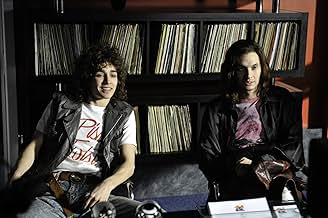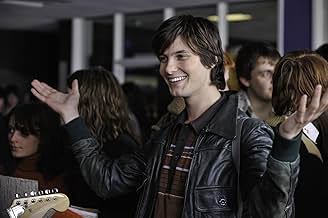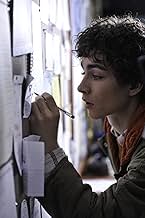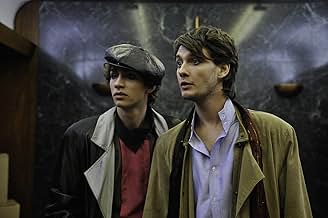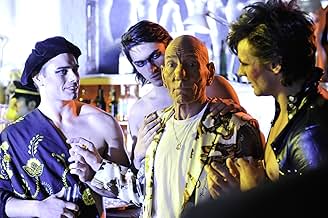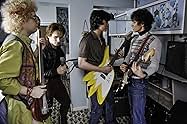Killing Bono
- 2011
- Tous publics
- 1h 54min
NOTE IMDb
6,3/10
6,8 k
MA NOTE
Deux frères tentent de devenir des rock stars planétaires, mais doivent se contenter de voir leurs anciens camarades d'école former le groupe U2 et devenir le plus grand groupe du monde.Deux frères tentent de devenir des rock stars planétaires, mais doivent se contenter de voir leurs anciens camarades d'école former le groupe U2 et devenir le plus grand groupe du monde.Deux frères tentent de devenir des rock stars planétaires, mais doivent se contenter de voir leurs anciens camarades d'école former le groupe U2 et devenir le plus grand groupe du monde.
- Réalisation
- Scénario
- Casting principal
Seán Duggan
- Liam
- (as Sean Duggan)
Avis à la une
I think the story this movie tells actually had some legs on it. It was interesting, there was depth and insight in it, but the director chose exactly the wrong tone for telling it and the result is an addition to the list of failures associated with the central figure. The tone is a mediocre wanting-to-please-everyone Grange Hill TV vibe with none of the serious themes coming through well because everything is played for light, obvious, almost slapstick laughs; it's delivery so rooted in dated TV stylings that you wonder what the production team were thinking. Sure the story is from the 80's but cinema has grown leaps and bounds since then. Look to the documentary Anvil for how something like this could better be handled. Some of the cast were well chosen but their delivery was well off, in keeping with the bad choice of feel. I wish this film was better, and another production team may well milk it for the good it has in its story, if it gets another shot at its 15 mins of fame. On a side note original videos of the real band shook up show them to be something quite terrible, so that kind of ruins everything.
A few years ago there was an achingly trendy 'electro rock' band called Bono Must Die. It was sued out of existence by Bono himself who clearly didn't like the idea of young, hip people swinging their pants to tunes built on Bono-hatred. Now there's a new film out called Killing Bono, yet far from troubling the normally so sensitive singer, it has received his backing. It isn't hard to see why. It's like a creation myth for U2, depicting Bono as a long-suffering saint and his band as a punkish, rebel outfit rather than the Po-faced promoters of 'world music' they really were.
The film is based on rock critic Neil McCormick's book, I Was Bono's Doppelgänger. It tells the true-ish story of Dublin-born Neil and his brother Ivan trying to make it in pop and/or rock while continually being overshadowed by their former schoolfriends Paul Hewson and Dave Evans – otherwise known as Bono and The Edge, whose band The Hype later becomes U2 and conquers the world, while Neil and Ivan scrape by in a dingy flat in London where their numerous record company rejection letters are pinned to the wall in the shape of the word 'WANKERS'.
The trouble is that in turning U2 into the barometer by which he measures and gets miserable about his own rubbishness, McCormick's book and now celluloid life story make Bono a saintly, inscrutably good, otherworldly figure. Bono (Martin McCann) floats through the movie in a Christ-like fashion, always impeccably turned out, voice calm, never saying words like 'bollox' or 'shite' as his schoolmates and the McCormicks do. He does, however, eat chips at one point, which is a kind of shocking image.
It is entirely feasible, of course, that Bono really was like this: aloof, pure, pompous. That would not come as a surprise to anyone who has seen footage of Bono performing in the Eighties, with his big hair, high heels, and breathy, strangely American-accented mini-speeches about uprisings in Soweto (good) or uprisings in Northern Ireland (bad). Yet in investing Bono with an ethereal quality, in making him the yin to McCormick's yang, the movie comes across less like a rock biopic than as a conservative morality tale stuffed with righteous seers and wayward scallywags. Bono effectively saves the McCormick brothers, with a speech in the back of a limousine about brotherly love, in a not dissimilar fashion to the way Christ rescued James and John from a life of fishery.
The mythologising extends to the way U2's music is presented. They're depicted as the heirs to punk, bashing out Iggy Pop songs in a garage before going on to conquer and colonise a bland pop landscape with heartfelt music. In truth, far from being the punks of the Eighties, U2 were the equivalent of those Seventies Po-faced prog rock bands that punk eventually swept aside. U2's own comeuppance came towards the end of the Eighties when, after a decade of thrilling ageing rock critics and Americans but boring the rest of us rigid with their sweeping and serious guitar songs, they were elbowed aside by the rebirth of pop hedonism: rave, acid, baggy, whose adherents didn't go to gigs to learn about Nelson Mandela but to get smashed.
U2's out-of-touchness was brilliantly illustrated by their release in 1988 of the film and album Rattle and Hum, their most worthy dose of blackish, bluesy, Elvisy Americana to date, at a time when the kidz were knocking back Es and dancing like mental patients. 'Bombastic and misguided', said one critic of Rattle and Hum. 'Pretentious', said the rest. And of course U2 only made things worse when they tried to recover by releasing the electronic dance-inspired Achtung, Baby! in 1991. It was as if Jethro Tull had tried to play 'Pretty Vacant'. Just as the punks cheered upon hearing of the death of the fat, bloated Elvis in 1977, so some young 'electro rockers' today wish for the death of Bono.
It really is only a handful of serious rock critics who still treat U2 seriously, fantasising that they are 'real' where most others are fake. As a result, Killing Bono, the life and times of a rock critic in the making, ends up being deeply conservative. Part On The Buses, part Rattle and Hum, it combines slapstick humour with Bono sanctification to tell a pretty warped story about both U2 and the Eighties.
The film is based on rock critic Neil McCormick's book, I Was Bono's Doppelgänger. It tells the true-ish story of Dublin-born Neil and his brother Ivan trying to make it in pop and/or rock while continually being overshadowed by their former schoolfriends Paul Hewson and Dave Evans – otherwise known as Bono and The Edge, whose band The Hype later becomes U2 and conquers the world, while Neil and Ivan scrape by in a dingy flat in London where their numerous record company rejection letters are pinned to the wall in the shape of the word 'WANKERS'.
The trouble is that in turning U2 into the barometer by which he measures and gets miserable about his own rubbishness, McCormick's book and now celluloid life story make Bono a saintly, inscrutably good, otherworldly figure. Bono (Martin McCann) floats through the movie in a Christ-like fashion, always impeccably turned out, voice calm, never saying words like 'bollox' or 'shite' as his schoolmates and the McCormicks do. He does, however, eat chips at one point, which is a kind of shocking image.
It is entirely feasible, of course, that Bono really was like this: aloof, pure, pompous. That would not come as a surprise to anyone who has seen footage of Bono performing in the Eighties, with his big hair, high heels, and breathy, strangely American-accented mini-speeches about uprisings in Soweto (good) or uprisings in Northern Ireland (bad). Yet in investing Bono with an ethereal quality, in making him the yin to McCormick's yang, the movie comes across less like a rock biopic than as a conservative morality tale stuffed with righteous seers and wayward scallywags. Bono effectively saves the McCormick brothers, with a speech in the back of a limousine about brotherly love, in a not dissimilar fashion to the way Christ rescued James and John from a life of fishery.
The mythologising extends to the way U2's music is presented. They're depicted as the heirs to punk, bashing out Iggy Pop songs in a garage before going on to conquer and colonise a bland pop landscape with heartfelt music. In truth, far from being the punks of the Eighties, U2 were the equivalent of those Seventies Po-faced prog rock bands that punk eventually swept aside. U2's own comeuppance came towards the end of the Eighties when, after a decade of thrilling ageing rock critics and Americans but boring the rest of us rigid with their sweeping and serious guitar songs, they were elbowed aside by the rebirth of pop hedonism: rave, acid, baggy, whose adherents didn't go to gigs to learn about Nelson Mandela but to get smashed.
U2's out-of-touchness was brilliantly illustrated by their release in 1988 of the film and album Rattle and Hum, their most worthy dose of blackish, bluesy, Elvisy Americana to date, at a time when the kidz were knocking back Es and dancing like mental patients. 'Bombastic and misguided', said one critic of Rattle and Hum. 'Pretentious', said the rest. And of course U2 only made things worse when they tried to recover by releasing the electronic dance-inspired Achtung, Baby! in 1991. It was as if Jethro Tull had tried to play 'Pretty Vacant'. Just as the punks cheered upon hearing of the death of the fat, bloated Elvis in 1977, so some young 'electro rockers' today wish for the death of Bono.
It really is only a handful of serious rock critics who still treat U2 seriously, fantasising that they are 'real' where most others are fake. As a result, Killing Bono, the life and times of a rock critic in the making, ends up being deeply conservative. Part On The Buses, part Rattle and Hum, it combines slapstick humour with Bono sanctification to tell a pretty warped story about both U2 and the Eighties.
... given that I went watching it without reading a book, seeing trailer, heard which actors are involved or anything else about it.
In case you don't know what is it about, let me repost the plot: "Two brothers attempt to become global rock stars but can only look on as old school friends U2 become the biggest band in the world."
Story is the best part of this movie. Throughout it's entire length I was wondering which way will it go. Will it keep it's mild comedy tone from start to the end, or will it turn to tragedy, given the main character's auto-destructive nature ... or maybe, could it even have some alternative history ending like in "Inglorious Bastards" ? Well, it could have gone either way, and because I don't wanna spoil anything for you, I'll just say I'm most satisfied how it finished.
Also, I have nothing but praises for the cast. Ben Barnes... I'm surprised you still aren't big thing in Hollywood. Weekest link might only be his on-screen brother, the guy with curly hair, but he's not bad enough to ruin the movie ... go watch !
In case you don't know what is it about, let me repost the plot: "Two brothers attempt to become global rock stars but can only look on as old school friends U2 become the biggest band in the world."
Story is the best part of this movie. Throughout it's entire length I was wondering which way will it go. Will it keep it's mild comedy tone from start to the end, or will it turn to tragedy, given the main character's auto-destructive nature ... or maybe, could it even have some alternative history ending like in "Inglorious Bastards" ? Well, it could have gone either way, and because I don't wanna spoil anything for you, I'll just say I'm most satisfied how it finished.
Also, I have nothing but praises for the cast. Ben Barnes... I'm surprised you still aren't big thing in Hollywood. Weekest link might only be his on-screen brother, the guy with curly hair, but he's not bad enough to ruin the movie ... go watch !
I was surprised
Release: 1st April 2011 The best scene in Killing Bono has to be the opening scene where we see Ben Barnes, in his character Neil McCormick, narrates a brief of what the story of Killing Bono is about without directly looking at the camera. At another point in the film, it proves significant and you would figure out why I thought it was the best scene.
The coming-of-age story features brothers Neil and Ivan McCormick (Robert Sheehan) who attempt to break into the music industry and when attempting, they look up to their secondary school friends U2 as they become an extremely popular band.
The good bits: This perspective of U2, one of the most successful bands ever, from brothers that are unheard of is one that U2 fans are recommended to view as they'll learn some more about their favourite band's history. The acting from Sheehan and Barnes is convincing, particularly from Barnes who possesses a strong Irish accent in this film despite being an English actor. This story is very intriguing. It grips you, especially in the scenes where there's a conflict, so it doesn't make sure that you'll be heading for the exits at any time. There are no useless scenes – the film contains a lot in the two hours that it spans in, and all the scenes fill in the time rather than waste it. The late Pete Postlethwaite made his last appearance in this film. The film has some messages in life that the characters come to realise. Life's too short to be dreaming about success, go ahead and go for it. Compared to Hamm's last film, Godsend, this is a superior effort from the director.
The bad bits: It'll appeal to U2 fans but it does not have any of their music as the film mainly focuses on the McCormick's so that may disappoint some. The film strikes an uneven balance between comedy and drama. One moment makes the audience laugh and the next changes the tone completely. A lot of the second half is serious drama. It doesn't have an emotional core. There's a character that, thanks to his actions, would be more likely to be looked at with pity rather than sympathy during his bad times. Unlike most bio-pics, don't expect to be inspired by the end. Making a film revolved around unknown real life figures will probably not grab many people's attention so Killing Bono is unlikely to be successful.
Verdict: It doesn't go without its flaws and isn't anything outstanding but Killing Bono is an interesting, entertaining, and sometimes funny film. I was surprised to see that it was actually a good film.
Check out more of Musanna's Film Reviews @ musannaahmed.blogspot.com
Release: 1st April 2011 The best scene in Killing Bono has to be the opening scene where we see Ben Barnes, in his character Neil McCormick, narrates a brief of what the story of Killing Bono is about without directly looking at the camera. At another point in the film, it proves significant and you would figure out why I thought it was the best scene.
The coming-of-age story features brothers Neil and Ivan McCormick (Robert Sheehan) who attempt to break into the music industry and when attempting, they look up to their secondary school friends U2 as they become an extremely popular band.
The good bits: This perspective of U2, one of the most successful bands ever, from brothers that are unheard of is one that U2 fans are recommended to view as they'll learn some more about their favourite band's history. The acting from Sheehan and Barnes is convincing, particularly from Barnes who possesses a strong Irish accent in this film despite being an English actor. This story is very intriguing. It grips you, especially in the scenes where there's a conflict, so it doesn't make sure that you'll be heading for the exits at any time. There are no useless scenes – the film contains a lot in the two hours that it spans in, and all the scenes fill in the time rather than waste it. The late Pete Postlethwaite made his last appearance in this film. The film has some messages in life that the characters come to realise. Life's too short to be dreaming about success, go ahead and go for it. Compared to Hamm's last film, Godsend, this is a superior effort from the director.
The bad bits: It'll appeal to U2 fans but it does not have any of their music as the film mainly focuses on the McCormick's so that may disappoint some. The film strikes an uneven balance between comedy and drama. One moment makes the audience laugh and the next changes the tone completely. A lot of the second half is serious drama. It doesn't have an emotional core. There's a character that, thanks to his actions, would be more likely to be looked at with pity rather than sympathy during his bad times. Unlike most bio-pics, don't expect to be inspired by the end. Making a film revolved around unknown real life figures will probably not grab many people's attention so Killing Bono is unlikely to be successful.
Verdict: It doesn't go without its flaws and isn't anything outstanding but Killing Bono is an interesting, entertaining, and sometimes funny film. I was surprised to see that it was actually a good film.
Check out more of Musanna's Film Reviews @ musannaahmed.blogspot.com
To truly appreciate this film you'll either have to be 40 something plus or be heavily involved in your own peer group's music scene. The League of Gentleman have a failed musician character that they play for the pathos type of comedy. Here, a real 'failed' musician finds comedy in rewriting his own aborted attempt at snatching fame and fortune in the fickle music industry. It's a very affectionate account - skating gently over the less pleasant aspects of the industry. Robert Sheehan is a dream as Ivan - oooh yes you could really see him in the U2 line up - something brother Neil prevented from happening. I honestly was transported back to the 1980's and dodgy music venues and half baked bands performing as if their lives depended on it. Fabulous. Not everyone's cup of tea though. Pure nostalgia for me - but oh I do wish they'd managed to sneak in a bit more of actual U2 music.
Le saviez-vous
- AnecdotesThe real brothers Ivan and Neil McCormick made a cameo in this movie. They are the folks watching one of the first gigs in an empty bar.
- GaffesAt the bands first practice (in 1976) Ivan McCormick suggests playing a song by Dire Straits. Dire Straits recorded their first album in 1978, so none of them would have known any songs by Dire Straits, let alone have even heard of them.
- Citations
Ivan McCormick: You made the worst decision of my life!
- ConnexionsFeatured in Ebert Presents: At the Movies: Épisode #2.16 (2011)
Meilleurs choix
Connectez-vous pour évaluer et suivre la liste de favoris afin de recevoir des recommandations personnalisées
- How long is Killing Bono?Alimenté par Alexa
Détails
- Date de sortie
- Pays d’origine
- Site officiel
- Langue
- Aussi connu sous le nom de
- Hạ Gục Bono
- Lieux de tournage
- Sociétés de production
- Voir plus de crédits d'entreprise sur IMDbPro
Box-office
- Montant brut mondial
- 717 798 $US
- Durée
- 1h 54min(114 min)
- Couleur
- Mixage
- Rapport de forme
- 2.35 : 1
Contribuer à cette page
Suggérer une modification ou ajouter du contenu manquant







